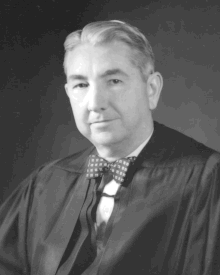Tom C. Clark
Tom Campbell Clark (born September 23, 1899 in Dallas - † June 13, 1977 in New York City ) was an American lawyer, politician, attorney general (Attorney General) and judge at the Supreme Court of the United States .
Studies and professional career
Clark was a Infantryman in the Texas National Guard towards the end of World War I in 1918 . He then completed a law degree at the Law School of the University of Texas , from which he graduated in 1922 with a Bachelor of Laws (LL.B.). After admission to the bar , he joined his father's law firm in Dallas , which he operated until 1937. In the meantime he was a District Attorney in Dallas from 1927 to 1932.
Rise to Justice Minister under President Truman
Clark, a member of the Democratic Party , joined the Justice Department in 1937. There he was a special prosecutor in the Bureau of War Risk Litigation. Just one year later he became special assistant to the assistant to the minister of justice and head of the antitrust law department. Between 1940 and 1942 he was the head of the US West Coast Office in the Antitrust Department .
During World War II , he was also the civil coordinator for the resettlement of Japanese-born American citizens in California and other states from 1942 to 1943 . Subsequently, in 1943, he became the war fraud unit and first assistant to the assistant attorney general and head of the antitrust law department. In August 1943 he finally became assistant to the Minister of Justice and head of the criminal department of the Ministry of Justice.
On 27 June 1945 it appointed President Harry S. Truman to the Minister of Justice (Attorney General) in his cabinet. He held this office until July 26, 1949.
As attorney general, he was a key adviser to the president and a key supporter of the president's anti-communist campaign that later culminated under Republican Senator Joseph McCarthy .
Supreme Court Justice
On August 24, 1949 he was appointed by Truman to succeed Frank Murphy , who died on July 19, as a judge at the Supreme Court of the United States .
According to Truman's biography, he is said to have later regretted the appointment. Truman is making this change based on the Supreme Court decision in the Youngstown Sheet & Tube Co. v. Sawyer, in which the Supreme Court curtailed the president's power, despite the fact that Clark previously believed, as attorney general, that the president could confiscate a plant to stave off a strike.
During his judicial work, Clark was mostly a representative of conservative views, although he was in part also the author of fundamental judgments on the extension of individual rights. As a judge, with his approval of the Brown v. Board of Education to end racial segregation . During the McCarthy era , he was a staunch opponent of communism .
He resigned as Supreme Court Justice on June 12, 1967 to avoid a conflict of interest after his son Ramsey Clark was appointed Attorney General in the government of President Lyndon B. Johnson on March 10, 1967 . His successor as judge was Thurgood Marshall, the first African American on the Supreme Court.
After his resignation, he was, among other things, director of the Federal Judicial Center and chairman of the board of directors of the American Judicial Society.
A year after his death became a high school in San Antonio ( Texas named) after him.
literature
- Evan Young: Lone Star Justice: A Biography of Justice Tom C. Clark. 1998, ISBN 1885777116
Web links
- Tom C. Clark in the Miller Center of Public Affairs of the University of Virginia (English)
- Biography on the homepage of the Ministry of Justice
- Biography on the homepage of the US Supreme Court
- Collected Writings in the University of Texas Library
- Jerry N. Hess: Oral History Interview with Tom C. Clark. 1972/73
- Questions for Justice Clark. Article in TIME magazine on May 25, 1953
| personal data | |
|---|---|
| SURNAME | Clark, Tom C. |
| ALTERNATIVE NAMES | Clark, Tom Campbell (full name) |
| BRIEF DESCRIPTION | American lawyer and attorney general |
| DATE OF BIRTH | September 23, 1899 |
| PLACE OF BIRTH | Dallas |
| DATE OF DEATH | June 13, 1977 |
| Place of death | New York City |



